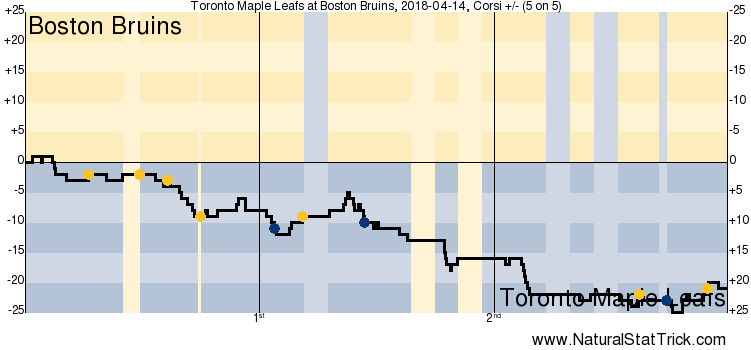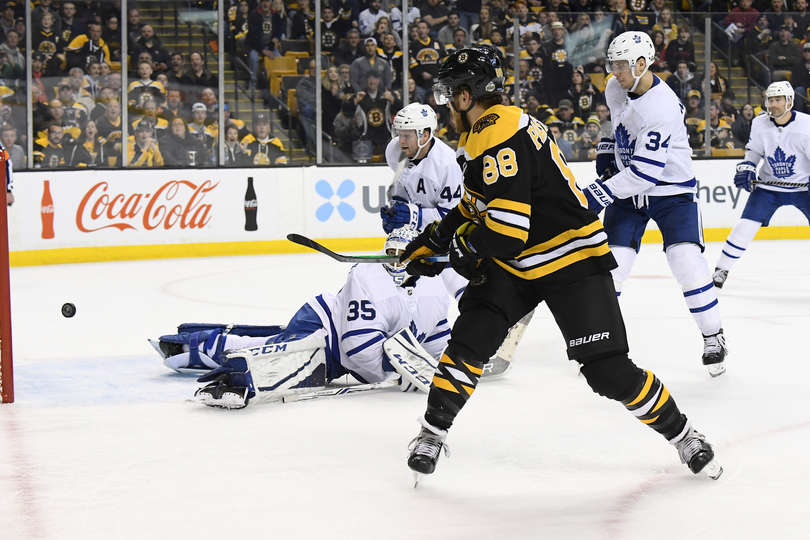It went from bad to worse in Game 2 for the Toronto Maple Leafs, who will be glad to get out of Boston for the time being as they attempt to hit the reset button on this series.
Your game in ten:
1. We can get into some line combination discussions and a look at individual performances, but the Leafs are going to have to ask themselves a fundamental question now going back home: Are they going to dig in and push back, or are they going to get pushed around all series? As Anthony put it in a tweet, David Pastrnak just set an NHL record for points in a playoff game (6) for a player that young and has nine points in two games, and he’s barely been touched. The time and space Pastrnak has had around the Leafs net in the first two games, and on all three goals in Game 2, is more All-Star Game than playoff game. The Bergeron line is having a laugh at the Leafs’ expense. It’s now a matter of pride.
2. As far as apportioning the criticism for the way Games 1 and 2 have gone, there is plenty to go around through two games, but it starts with the head coach on down. Whether it’s the matchup chasing or just the struggles in general, the bench has been completely out of sorts to the tune of too-many-men penalties in consecutive games — inexcusable in the regular season, let alone in a playoff series – and it also played an indirect role in the opening Bruins goal after Travis Dermott scrambled for a change and got caught somewhat. The buck stops with Mike Babcock there.
3. The knee-jerk reaction to put Nikita Zaitsev into that top matchup role, given the way Zaitsev has struggled throughout most of the season and especially post-injury, clearly backfired. Zaitsev was a deer in headlights with and without the puck, with countless head-shaking moments throughout the game, and finished up at a -2 – conceding two against the Bergeron line – in addition to some struggles on the penalty kill.
4. Babcock and DJ Smith are by no means in an enviable position here given the results in Game 1 and regression of Ron Hainsey down the stretch and into Games 1 and 2, with Morgan Rielly (in addition to some of his own struggles) suffering from the erosion of Hainsey’s stabilizing influence. Babcock also probably thought back to the Washington series last Spring and how Zaitsev and Gardiner stepped it up reasonably well when tasked with a tough assignment against the Ovechkin line. But Zaitsev looks lost right now, and frankly, he has for most of the season. It wasn’t hard to picture that going south. If Babcock is thinking at all of a shakeup on the backend and possibly inserting Connor Carrick, Zaitsev looks like a candidate who could use the perspective of the press box. I don’t expect it to happen, though.
5. The cliché about a series not being over until you lose at home does apply here. Playoff momentum swings can be drastic if the Leafs can get a few things to finally break their way. However, it’s more difficult to be optimistic about the Leafs getting back on home ice without Nazem Kadri available for either of these games.
The big benefit of home ice was that the Leafs were going to be able to shadow Bergeron with Kadri and free up Matthews. Besides that matchup setup being lost – a huge deal for a team with a sheltered scoring/non-checking unit as its third line – Kadri is the heart and soul of the team as far as dragging his teammates into the fight. Since Kadri left the game against Boston in period three of Game 1, the Leafs have been out-scored 9-3. Kadri’s importance on the team is hard to overstate, and that’s especially the case when you’ve got the matchup nightmare that is the best forward line in the NHL.
The confines of the ACC should provide a psychological boost, though, for a team that won a lot in that building this year, especially in the second half of the season.
6. The Bruins are clearly in the Leafs’ heads and the Leafs are definitely showing signs of playing scared. Boston is getting after the Leafs on the forecheck and the Leafs look jumpy going back for pucks and getting pucks out. The delay-of-game penalty taken by Marner, with an assist to JVR, was a good example of how the Leafs are hearing footsteps even when they’re not there and they’ve got the time to make a play. Part of it is that the Leafs have to start tilting the ice more in their favour with extended o-zone shifts so that Boston is dumping and changing more often, taking the sting out of their forecheck (when the game still matters). The other part is that the Leafs have compose themselves again and start executing cleaner zone exits by making plays under pressure. The Leafs did get off to a better start as far as offensive-zone time in this game. But they were only really able to do this consistently once Boston started to sit back a bit with a huge lead.
7. The bottom has fallen out on the Leafs penalty kill (it’s given up five on 10 opportunities), where the team looks flaccid in front of its own net – there’s nothing complicated about what the Bruins are doing there other than getting pucks to the net and winning battles. The Leafs have to dig in and start boxing out properly. The Bruins are a really good team, but the Leafs are making them look way better than they are. It’s just way too easy.
On the power play, it’s crazy how dwindling confidence spreads like a virus, affecting all areas of a team’s game. After it ended the year like gangbusters and looked good in Game 1, suddenly the Leafs power play was pretty stagnant, with not enough movement happening in order to open shooting lanes. The late third-period goal should serve as a little consolation, but coming up empty-handed on back-to-back power plays with a chance to pull within two with lots of time left on the clock in the first half of the third period was the end of the game.
8. The Leafs’ need to generate more offensive zone time and work the walls more effectively makes Josh Leivo an interesting option for Game 3. How he would look jumping into the fast lane with little game action under his belt is anyone’s guess, though. Given he’s a skilled guy who needs his reps and touches more than a guy like Matt Martin does in order to work his way back to form, I’d expect Martin to be the more likely insertion as Babcock searches for a quick shot in the arm.
9. The reporting on Matthews “shit happens’ line after the game was a great demonstration of how careful reporters need to be when sharing quotes on Twitter.
Auston Matthews, asked about the Bergeron line having 20 points: “Shit happens, I guess. That’s hockey.”
— Chris Johnston (@reporterchris) April 15, 2018
This tweet got thousands of engagements, and it inspired responses like these:
Leader material https://t.co/5atviXkN6j
— Kevin McGran (@kevin_mcgran) April 15, 2018
This is the difference between former Maple Leafs captain Dion Phaneuf and future Maple Leafs captain Auston Matthews pic.twitter.com/f35jePAPuA
— Bar South N Celly™ (@BarSouthNCelly) April 15, 2018
The problem is it’s not a full or fair representation of what Matthews said and why he said it.
The context was that Matthews was actually asked, essentially, “Could you have foreseen Bergeron line’s production in Games 1 and 2 in your wildest imaginations?” It’s not a question Matthews could do much with. He replied by saying that shit happens in this sport, and that you’ve got to move forward and respond in the next game (the only thing a player can say in his situation).
He did not answer a question about why the matchup was going poorly or his role in it with a dismissive, “I don’t know, shit happens” response. That’s a key distinction, but it wasn’t clear in the original tweet.
10. To an extent, this is an unfortunate byproduct of the limitations of the Twitter medium, where soundbites are stripped of their context, paraphrased and blasted out to the masses. But this should’ve been carried out more responsibly by the reporter who originally tweeted it and the reporters who then piled on.
The sad thing is you’ll probably hear some fans talk about this for months to follow like it’s evidence of a failing in Matthews’ leadership ability.
Game Flow: 5v5 Shot Attempts
















![John Gruden after the Leafs prospects’ 4-1 win over Montreal: “[Vyacheslav Peksa] looked really comfortable in the net… We wouldn’t have won without him” John Gruden, head coach of the Toronto Marlies](https://mapleleafshotstove.com/wp-content/uploads/2025/09/gruden-post-game-sep-14-218x150.jpg)


















